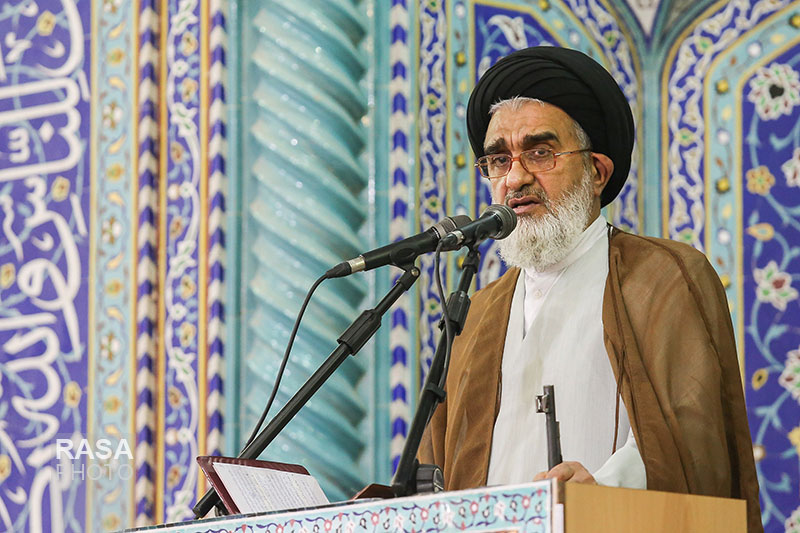
RNA – In his Friday prayer sermon delivered to a large and fervent crowd of believers in Qom’s Qods Prayer Hall, Ayatollah Sayyed Mohammad Sa’idi said that when the security of the economy is compromised, the people become hopeless and added, “In this case, the people won’t be eager for the national economy and the acquisition of that which is lawful. This is why Islam gives the most severe punishment, both in this world and in the hereafter, for those who commit theft and encroach on the security of the people and the country.”
The custodian of the Holy Shrine of Lady Fatimah al-Ma’sumah referred to political piety and said, “An Islamic politician must not eat bread at the rate of the day and then wheel and deal with the enemies. Such a politician must not approve, sign and enforce a treaty that is contrary to Islam and is against the interests of the country and the people because of their dependence on a particular movement or faction.”
Referring to the historical disclosure of the colonialist and disgraceful Capitulation agreement by the late founder of the Islamic Revolution, Imam Khomeyni, he said, “This agreement was referred to the Senate by the Shah and it approved the agreement. The agreement was then sent to National Consultative Assembly for final approval.”
Ayatollah Sa’idi continued, “Imam Khomeyni, as the vicegerent of Imam al-Mahdi, stood against this oppressive and colonialist agreement. In his speech on October 26, 1964, Imam Khomeyni shouted against the Shah, the United States and the Zionist regime, as well as against the representatives who signed this imposed and humiliating agreement which destroyed Iran’s dignity and greatness.”
The representative of the Supreme Leader of the Islamic Revolution [Ayatollah Khamenei] in Qom referred to the Arba’in al-Husayn pilgrimage and said, “Among the programs of the Shi’ahs during these days is the great Arba’in pilgrimage, which is considered as among the attributes of the believers. In this pilgrimage, the pilgrims remember the objectives of the uprising of Ashura and identify their positions in relation to Imam al-Husayn and the enemies.”
Referring to the lessons of the pilgrimage of Arba’in, he added, “The main and fundamental purpose of the uprising of Ashura was to awaken and guide the servants of God. Imam al-Husayn gave all he had on the path of awakening the Islamic ummah and had the ultimate invitation and advice. The second lesson is that sometimes the awakening of mankind and the breaking of idols and innovations eliminates the atmosphere of repression and the struggle against the oppressors necessitates blood and the more valuable the blood is, the more effective it is.”
Ayatollah Sa’idi offered recommendations to the Iranian servants and mawkibs [mourning organizations] and said, “The Iranian mawkibs in Iraq must be careful and know that protecting the reverence of the host country, especially the Iraqi mawkibs, is necessary for all of us. The form of reception must not be to the detriment of those loved ones. The Pure Imams insisted on this issue.”
His Eminence said that the Arba’in al-Husayn pilgrimage is a resurrection and the cause of the dignity of the Islamic ummah, said, “The Arba’in epic is a battle that blinds the enemies and thus, we must distance ourselves from the margins.”
Rasa News Agency
112/973